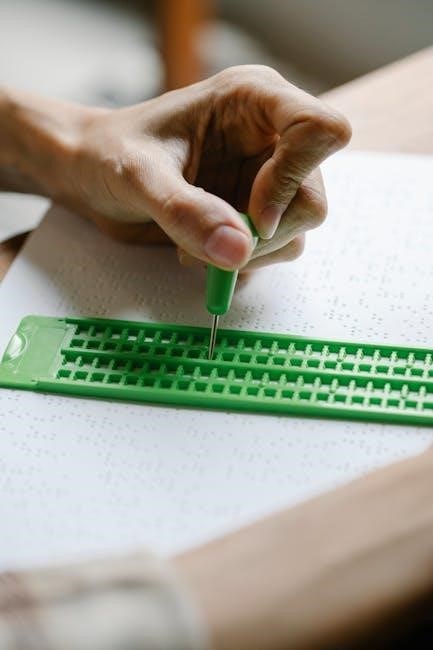DBT skills manual for adolescents provides a guide for mental health practitioners working with adolescents struggling to control emotions and behaviors using dialectical behavior therapy techniques effectively always․
Overview of Dialectical Behavior Therapy for Adolescents
Dialectical behavior therapy for adolescents is a type of psychotherapy that focuses on teaching skills to manage emotions, behaviors and relationships․
It is an adaptation of dialectical behavior therapy for adults, modified to meet the unique needs of adolescents․
The therapy typically involves individual sessions, skills training groups, and family therapy, and may also include phone coaching and other forms of support․
The goal of dialectical behavior therapy for adolescents is to help them develop the skills they need to manage their emotions, behaviors, and relationships effectively, and to reduce the risk of suicidal and self-injurious behaviors․
According to the information available, dialectical behavior therapy for adolescents can be an effective treatment for a range of mental health conditions, including depression, anxiety, and post-traumatic stress disorder․
It can also help adolescents develop healthier relationships with their family and friends, and improve their overall quality of life․
By teaching adolescents the skills they need to manage their emotions and behaviors, dialectical behavior therapy can help them develop a more positive and hopeful outlook on life․

DBT Skills Training for Adolescents
DBT skills training for adolescents includes learning mindfulness and emotional regulation techniques to manage behaviors effectively always using dialectical behavior therapy methods and skills training․
Adapting DBT Modules for Adolescent Development
Adapting DBT modules for adolescent development is crucial for effective treatment․ The DBT skills manual for adolescents provides a comprehensive guide for mental health practitioners to adapt DBT modules for adolescent development․ This includes modifying the skills training to meet the unique needs of adolescents, such as incorporating examples and exercises that are relevant to their lives․ The manual also provides guidance on how to adapt the DBT modules to address specific issues that adolescents may face, such as peer relationships and academic pressures․ By adapting the DBT modules in this way, mental health practitioners can help adolescents develop the skills they need to manage their emotions and behaviors effectively․ The adapted DBT modules can be used in a variety of settings, including individual therapy, skills training groups, and family therapy․ Overall, adapting DBT modules for adolescent development is an essential part of providing effective DBT treatment for adolescents․
Covering Mindfulness, Distress Tolerance, and Emotion Regulation
The DBT skills manual for adolescents covers essential skills such as mindfulness, distress tolerance, and emotion regulation․ These skills are critical for adolescents to manage their emotions and behaviors effectively․ The manual provides a comprehensive guide on how to teach these skills to adolescents, including examples and exercises that can be used in skills training groups․ Mindfulness skills help adolescents become more aware of their thoughts and feelings, while distress tolerance skills help them cope with difficult emotions․ Emotion regulation skills help adolescents manage their emotions in a healthy way․ By covering these skills, the DBT skills manual for adolescents provides mental health practitioners with the tools they need to help adolescents develop emotional regulation and resilience․ The manual also provides guidance on how to adapt these skills to meet the unique needs of adolescents, making it a valuable resource for mental health practitioners working with this population․
Comprehensive DBT Programs for Adolescents
Comprehensive DBT programs for adolescents include individual therapy and skills training groups for effective treatment always using dialectical behavior therapy techniques and methods properly․
Individual Therapy and Skills Training Groups
Individual therapy and skills training groups are essential components of comprehensive DBT programs for adolescents․ These groups provide a safe and supportive environment for adolescents to learn and practice DBT skills․ The individual therapy sessions focus on helping adolescents develop self-awareness, manage emotions, and improve relationships․ Skills training groups, on the other hand, teach adolescents specific skills such as mindfulness, distress tolerance, and emotion regulation․ These groups are typically led by trained therapists who have experience working with adolescents․ The therapists use a variety of techniques, including role-playing, discussions, and exercises, to help adolescents understand and apply DBT skills in their daily lives․ By combining individual therapy and skills training groups, adolescents can receive comprehensive treatment that addresses their unique needs and challenges․ This approach has been shown to be effective in reducing symptoms of mental health disorders and improving overall well-being in adolescents․
Family Therapy and Multi-Family Skills Training Groups
Family therapy and multi-family skills training groups play a crucial role in supporting adolescents with mental health disorders․ These groups provide a platform for families to learn and practice DBT skills together, promoting a supportive and collaborative environment․ Family therapy focuses on improving communication, problem-solving, and relationship dynamics, while multi-family skills training groups bring together multiple families to learn and practice DBT skills․ This approach helps families understand that they are not alone in their struggles and provides a sense of community and connection․ By working together, families can develop a deeper understanding of DBT principles and learn how to apply them in their daily lives, leading to improved relationships and overall well-being․ The inclusion of family members in the treatment process can also enhance the adolescent’s motivation and engagement, leading to better treatment outcomes and a more supportive home environment․

Applying DBT Skills with Adolescents and Their Families
Practitioners apply DBT skills with adolescents and families using techniques and strategies effectively always in therapy sessions and daily life situations with great care and support․
Learning from Experts in DBT and Adolescent Development
Learning from experts in DBT and adolescent development is crucial for effective therapy․
Experts like Marsha Linehan, Alec Miller, and Jill Rathus provide valuable insights and guidance on applying DBT skills with adolescents and their families․
Their expertise helps practitioners understand the unique challenges and needs of adolescents and develop effective treatment plans․
Online courses and workshops offer opportunities for practitioners to learn from experts and gain practical experience in applying DBT skills․
These learning experiences enable practitioners to stay updated on the latest research and best practices in DBT and adolescent development․
By learning from experts, practitioners can enhance their skills and knowledge, ultimately leading to better outcomes for adolescents and their families․
The expertise of these professionals is invaluable in helping practitioners navigate the complexities of adolescent development and DBT therapy․
Their contributions to the field have been significant, and their work continues to shape the development of DBT skills manuals for adolescents․
Overall, learning from experts is essential for providing effective DBT therapy to adolescents and their families․

DBT Skills Manual for Adolescents as a Practical Guide
DBT skills manual provides a clear and practical guide for mental health practitioners working with adolescents using dialectical behavior therapy techniques effectively always online․
Understanding and Applying DBT Skills in Adolescent Development
The DBT skills manual for adolescents offers a comprehensive guide for mental health practitioners to understand and apply DBT skills in the context of adolescent development and challenges․
The manual provides a clear and practical approach to teaching adolescents the skills they need to manage their emotions and behaviors effectively․
It includes a range of techniques and strategies for working with adolescents, including individual therapy, skills training groups, and family therapy․
The manual also provides guidance on how to adapt DBT skills for adolescents with different needs and abilities․
By using the DBT skills manual, mental health practitioners can help adolescents develop the skills they need to lead healthy and fulfilling lives․
The manual is a valuable resource for anyone working with adolescents, and is an essential tool for any mental health practitioner looking to provide effective and supportive care․
It is a practical guide that can be used in a variety of settings, including clinics, schools, and community organizations․

and Recommendations for DBT Clinicians
DBT clinicians working with adolescents can benefit from the DBT skills manual, which provides a comprehensive guide to teaching DBT skills․
The manual offers a range of techniques and strategies for working with adolescents, including individual therapy and skills training groups․
Clinicians can use the manual to develop effective treatment plans and provide supportive care to adolescents․
It is recommended that clinicians use the manual in conjunction with other DBT resources to provide the best possible care․
The manual is a valuable resource for clinicians looking to provide evidence-based care to adolescents․
By using the manual, clinicians can help adolescents develop the skills they need to manage their emotions and behaviors effectively․
The manual is an essential tool for any clinician working with adolescents, and can be used in a variety of settings․
Overall, the DBT skills manual is a practical and effective resource for DBT clinicians working with adolescents․
It provides a clear and comprehensive guide to teaching DBT skills and can be used to develop effective treatment plans․
